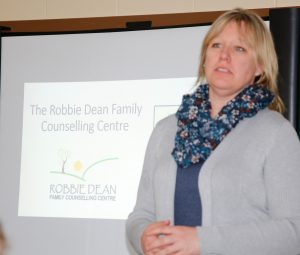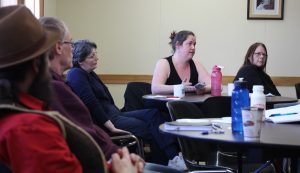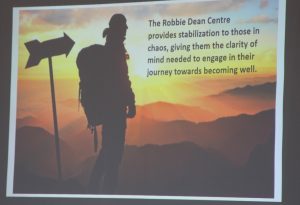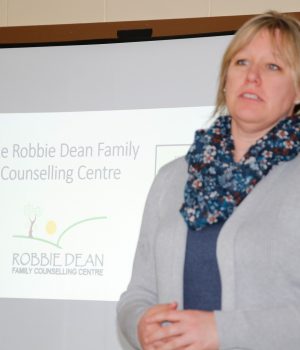by CONNIE TABBERT
Secretary
Renfrew County National Farmers Union
DOUGLAS — The Renfrew County National Farmers Union hosted a Mental Health Awareness Workshop on Saturday, hoping people from all walks of life would attend.
Who showed up was farmers, and the most interesting thing is they were farming women. Of the 10 who attended, seven were women.
The guest speakers were Monique Yashinskie, executive director of the Robbie Dean Family Counselling Centre based out of Pembroke, and centre counsellor Julie Daechsel.
Ms. Yashinskie started the Robbie Dean Family Counselling Centre on June 5, 2013 in Pembroke, two years after losing her 18-year-old son Robbie to suicide.
She knows her strong faith is a large part of the success of the centre. On Aug. 21, 2011, she walked in the forest behind her home speaking to God. Ms. Yashinskie said she had two choices – she could continue to question why this happened to her OR, she could ask God to take over her life, because she can’t do it alone.
Two years later, the centre was operating.
There are currently six staff members and tons of volunteers who ensure the success of the centre as it helps people deal with suicide prevention and crisis situations, Ms. Yashinskie said.
Counsellor Daechsel spoke with the group about depression and farmers in the morning, while in the afternoon Ms. Yashkinskie spoke about the centre and the services it provides.
Ms. Daechsel said depression is not sadness, as everyone feels sad sometimes.
“Depression is an intense sadness that lasts at least two weeks” and can affect every area of your life, she said. It interferes with your ability to work and interact with others. Depression affects a person’s emotions, thoughts, behaviour and physical well-being, she said. A person may have sudden mood-swings, self-criticize themselves, be pessimistic, withdraw from family and friends, neglect personal appearance and sleep too little or too much, she said.
It was interesting to note that in Canada, studies on farming are pesticide and chemical-based, while in Australia and Norway, studies have been done on farmers, Ms. Daechsel said.
What is also interesting to note, is that perceived stress does not have an impact on plans to remain in agriculture or the success of the farm, because it is expected stress, she said.
“You have to love farming to do it, it’s not something you do because you don’t love it,” she said.
In farming, there can be a lack of work/life balance, because one can be just like the other for a farmer, she said.
“Work is life and life is work, but, it’s important to differentiate between the two,” she said, adding, “You need to find things you enjoy outside of farming.”
Stress will always be a part of farming, because there are many things that affect farming that is out of the control of a person, such as the weather or an accident.
Ms. Daechsel said farmers also need to be resilient.
“Resilience is the ability to recover quickly from difficulties; to adapt well in the face of adversity, trauma, tragedy and threats of significant sources of stress,” she said.
To be resilient, a person needs a positive attitude, confidence in their strengths and abilities, skills in communication and problem solving, the ability to regulate emotions and the ability to see failure in the context of useful feedback.
Explaining, she said instead of seeing a failed crop one year so it means you should quit farming, try to see the positive of what happened and how to make it better next year.
There are 10 ways to build resilience: Make connections; avoid seeing a crisis as an insurmountable obstacle; accept that change is part of life; move toward your goals; take decisive actions; look for opportunities for self-discovery; nurture a positive view of yourself; keep things in perspective; maintain a hopeful outlook and take care of yourself.
“Self-care is so important,” she said.
When asked “How do you start the conversation” if you think someone is suicidal, Ms. Daechsel responded, “Start out with your own experience.”
Many farmers only have farming friends, so they experience the same things at various times in their lives – poor crop, animals dying, family break-up – and these can affect a person. If a person knows of someone going through these things, and sees changes in a person, ask the question, ‘Are you suicidal?’ when you are having a conversation.
One woman spoke about how she starts her day – by taking the dog outdoors and just being in the moment of nature. Ms. Daechsel responded, “We all need to find our moment. Appreciate the little things.”
In the afternoon, Ms. Yashinksie provided a brief history of the centre following its opening in 2013 in Pembroke. In July 2014, the centre expanded to Petawawa and Arnprior and a year later into Eganville.
In 2014, the bereavement organization closed its doors in Pembroke and she applied for funding to the United Way to find a way of providing grief support – and was successful in getting one-year funding. The centre now provides the grief and loss program.
The Centre then decided to provide counselling for those in retirement homes, partnering up with Chartwell Retirement Residences.
“Most crisis comes from a loss,” she said.
She told the story of an elderly woman living in a retirement who was always in bad humour. Following the start-up of the retirement home project, as it’s called, the woman met with the counsellor, and following visits, she became a very nice woman. It’s believed growing up this woman did not have the services of talking to someone about the difficulties in her life, so they built up. When she was able to talk about them with a non-judgemental person who could provide insight into what she was feeling, this woman’s whole outlook on life changed, Ms. Yashinskie said.
The centre also provides counselling for those in the LGBTQ group, which is lesbian, gay, bisexual, transgender and queer people. The highest rate for suicide in the world is from the LGBTQ youth aged 15 to 19 years old, she noted.
“One in 10 people identify as LGBTQ,” Ms. Yashinskie said.
Breaking that figure down, she noted there are 1,200 students at a local high school – that means 120 of them identify as being LGBTQ.
In January, the centre started REACH, which received funding from the Bell Let’s Talk campaign and the United Way, she said. REACH (Research-Educate-Assist-Connect-Hope) program is building a network of support services for those who come to the centre and, with the help of staff and volunteers, will ensure that the resource room provides current information to support those that need access to services. Ms. Yaskinskie said if someone needs housing, or a job, or financial assistance, they may not always know where to go for help. REACH program staff will be the go-between.
It also provides a parents peer support group, which meets the first Tuesday of every month at the Robbie Dean Centre from 6:30 to 8:30 p.m. in Pembroke and the second Wednesday of each month from 5:30 to 7:30 p.m. in Renfrew Victoria Hospital.
The walk-in clinics provided by RDFCC are Wednesdays, 3 to 7 p.m. at 315 Pembroke St. East in Pembroke; Thursdays 3 to 7 p.m. at 291 Plaunt Street in Renfrew; by appointment also in Eganville, Petawawa and Arnprior.
The vision of the Robbie Dean Centre is to be “a beacon of hope for individuals and families in distress and crisis that sheds light on their journey to wellness” while the mission statement is “The Robbie Dean Centre provides stabilization to those in chaos, giving them the clarity of mind needs to engage in their journey towards becoming well.”
Following the presentations, Ms. Yashinksie was presented with a basket of homemade goodies and a $300 donation from the Renfrew County National Farmers Union.
Ms. Yashinskie said that donation will cover three months of the centre’s communication costs.












![Kenopic/Smith Auction [Paid Ad]](https://whitewaternews.ca/wp-content/uploads/2018/10/advertising-100x75.jpeg)

